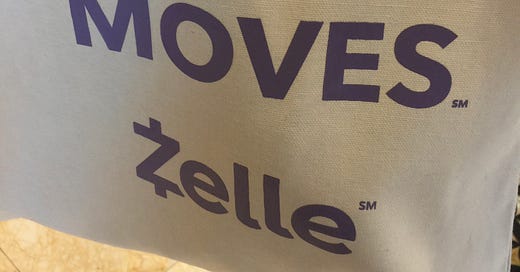Should Zelle be used for retail payment?
Yes, but only where there is a well-founded expectation of redress.
Dateline: Denver, 21st June 2022.
Writing in Progressive Grocer a few months ago, Ken Montgomery (COO of the Federal Reserve Bank of Boston) highlighted some of the ways that retailers might benefit from the introduction of account-to-account (A2A) instant payments.
Ken identified this new payment channel, powered by QR codes and wallets, as means to deliver
safe and secure payments both online and in-store;
instant payments to provide instant refunds to customers when they are needed;
and instant payments as a quick and easy way to load gift cards and prepaid debit cards.
I am sure that progressive grocers are already factoring these new options into their next generation infrastructure. In the US, for example, stakeholders are beginning to look at whether to extend Zelle in this direction.
Zelle continues to grow strongly (Bank of America customers made more Zelle transactions than wrote paper checks for the first time ever last year) and it is therefore no surprise that discussions about extending it into retail transactions are heating up. According to the Wall Street Journal, Wells Fargo and Bank of America are in favour of expanding into retail while JPMorgan is not convinced the time is right.
What the Zelle?
Zelle is already used for retail payments, of course, but not in America. While Americans PayPal and Venmo money to each other, in Venezuela they Zelle each other. As I have mentioned before, in Caracas the homemade signs reading "Aceptamos Zelle" (We accept Zelle) are in store windows everywhere. Computer printouts of the purple company logo are taped to cash registers in supermarkets, some of which have dedicated lines for customers paying with the app.
Why? Well, in Venezuela nearly three-quarters of all transactions are conducted in dollars and of those, while around two-thirds are still in cash, the electronic alternatives (such as wire transfers and Zelle) are growing fast. Given the choice to use whatever they want, it seems that the good people of Venezuela are voting with their fingers, and they are not opting for Bitcoin or NFTs or whatever. They are opting for greenbacks, as most people in most developing countries around the world would do if given the possibility.
It is easy to understand why. Steve Hanke, an economist at Johns Hopkins University and an expert on hyperinflation, says that dollarisation, "even if it is improvised" helps the inhabitants of Caracas and Maracaibo to protect themselves against bolívar's hyperinflation.
(I hadn't heard that phrase before — in my book The Currency Cold War I talked about dollars “permeating” developing economies — and I rather like it.)
Reuters has an interesting report on what this “improvised dollarisation” means in practice. Routine purchases are increasingly made in dollars and around $2 billion of cash in circulation is (mostly in denominations of $20, $50 and $100 bills). The shortage of low denomination bills means that businesses have to be creative. Hence the increased use of IOUs (or reputation currencies, if you will). A customer pays using a $10 bill but since there is a shortage of cash and change in circulation, the shopkeeper writes "owes $1.87" on the back of the receipt, thus turning it into a form of money for the customer to bring in on her next visit to the store.
(This in turn means that there is a significant premium on low-value bills, which trade above par. Reuters quote a street vendor in Maracaibo saying that "I collect the $1 dollar bills and go to the market, and for $17 of $1 notes, they give me a $20 dollar bill".)
As I understand it, then, the current situation in Venezuela is that the military mine Bitcoin to avoid US sanctions and other scrutiny, the opposition use a “stablecoin” (USDC ) to avoid government controls and the public opts for improvised dollarisation.
What an interesting case study in the evolution of money.
Developing Alternatives
America and Venezuela to one side, countries with more modern payments infrastructures are also looking to see if there is potential to grow A2A in retail. The UK's Payment Systems Regulator (PSR) has included in its plans for 2022/23 the removal of barriers to the uptake of A2A retail payments, which it says can provide a “credible” alternative to card schemes. As part of these plans it intends to investigate whether the commercial incentives for banks, intermediaries and merchants are there to support greater use of A2A payments and to see what it can do to increase uptake and promote competition with cards. The PSR is also working with the CMA, FCA and Treasury on the future of open banking regulation, which will play a major role in A2A payments uptake.
Similarly, in Europe, instant payments are advancing. Already around a tenth of SEPA Credit Transfers (SCTs) are already Instant Credit Transfers, or "SCT Inst", that began in 2017. These transfers are 24/7/365 and take less than ten seconds for the payee PSP to inform the payer PSP that the money has been received and to make the funds available to the recipient.
Now the European Payments Initiative (EPI), or “Le Third Scheme” as I call it, is being refocused to bring instant payments to online retail. Piotr Jan Pietrzak, Director of International Development at BLIK (the Polish payment system), wrote an excellent blog post for my good friend Chris Skinner on precisely this topic. He noted that EPI's misguided plans for omnichannel domination were a mistake, because it put EPI in direct competition with the US card schemes as well as the tech giants, while refocusing on instant payments makes it more feasible. I agree, and I hope that a pan-European request-to-pay and variable-recurring-payments are brought to merchants across the continent as soon as possible.
Regulatory pressures aside, merchants have every reason to hasten this evolution because as Tom Noyes points out, the merchants will gain consumer data, but A2A will leave the bank holding responsibility for managing the fraud. I can well imagine major retailers integrating an A2A EPI into their own apps and incentivising consumers to make these their preferred payment choice. In fact, by the time that Apple eventually caves in to the EU and allows access to EMV via the iPhone NFC interface, cards may well be a legacy payment method only used by old people, a bit like checks are today, except in America.
(Clearly Tom and I are not the only ones who are looking in this direction. When I wrote about A2A in Forbes last year I used the example of a Lithuanian payments startup called “kevin” that had just secured $10 million in a seed funding round. Last month I noticed that company had raised another $65 million in a Series A funding round led by Accel.)
Elsewhere, regulators are pushing service providers towards A2A. In India, for example, the Reserve Bank of India (RBI) introduced strict new rules for continuous authorities on payment cards, which means that online merchants (eg, Apple) have to set up fresh mandates and implement two-factor authentication (2FA) for recurring payments. Hence Apple has decided to stop taking cards and switch to A2A transactions (via India's Universal Payment Interface, UPI).
Expectations of redress
One major problem for A2A in the retail environment, though, is consumer protection. While Zelle and Venmo and other apps have become the preferred way for millions of consumers to transfer money (last year, people sent $490 billion on Zelle, and $230 billion through Venmo) because they are free, fast and convenient, those same factors have made them easy targets for scammers and thieves.
Hence it is quite understandable that one of the apparent reasons for JP Morgan's reticence on Zelle is the issue of fraud and how to protect consumers more effectively from the instant scammers who focus on instant payments. After all, consumers are well used to the protections afforded by card schemes and what we in the UK call "Section 75", or the ability to charge back card transactions unconditionally.
(If you order a sofa, for example, and the sofa company goes bankrupt then you can get your money back if you paid by card: the liability is on the card issuer and it is up to them to recover the money from the sofa company's bank or creditors.)
I suspect we may see a bifurcation around this issue because as a consumer, I don't especially need these protections if I am dealing with a trusted merchant where I have an expectation of redress. We used to call this the “rotten chicken” issue when planning new payment products: if I buy a chicken from Tesco and it is rotten, then I will take it back and they will give me another one. I don't need a third party to get involved because I have what my marketing colleagues referred to as a “well-founded expectation of redress”, a phrase that has stuck with me.
Let me illustrate the point further. I am writing this article on a plane. My ticket was purchased in the most expensive way imaginable (for the airline) using a platinum cash back corporate card. This means that British Airways were paying through the nose to the issuer so that the issuer can reward me with cash or points of whatever. You can see why the airline might prefer to have the money come from my bank account, bypassing the card, so that they can reward me directly: they can give me triple miles to go A2A. If they do this, I'll cheerfully take the deal for the next flight I need to book. I think it unlikely that British Airways will go bankrupt before SIBOS in Amsterdam. And if they cancel the flight (as they just did to a colleague on a different flight) then I know that they will rebook me or refund me and I'll get it sorted out.
(On the other hand, if I were required to book a segment on Air Ruritania, where I have no status, then I would absolutely use a credit card to protect myself.)
So to return the topic at hand then, should banks extend Zelle into retail? Despite the narcotic effect of interchange, I think they will, but not as a general-purpose card replacement. A Zelle option in the supermarket app, where consumers have a well-founded expectation of redress from the supermarket that works hard to attract and keep customers, makes sense but Zelle as an option to buy a dishwasher online from a cut-price white goods retailer 500 miles away probably does not.
Are you looking for:
A speaker/moderator for your online or in person event?
Written content or contribution for your publication?
A trusted advisor for your company’s board?
Some comment on the latest digital financial services news/media?






